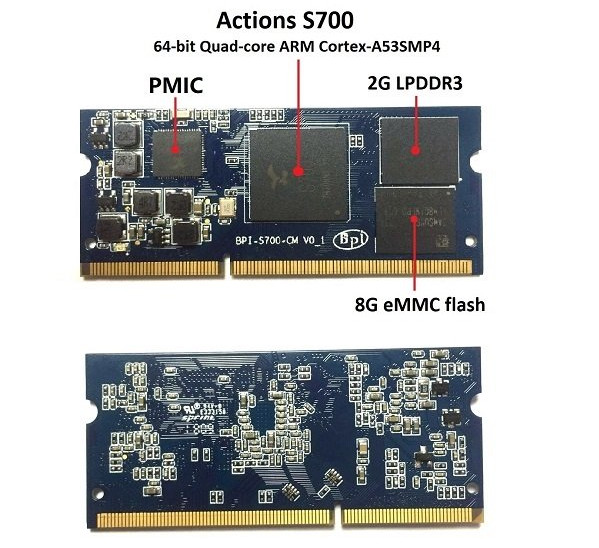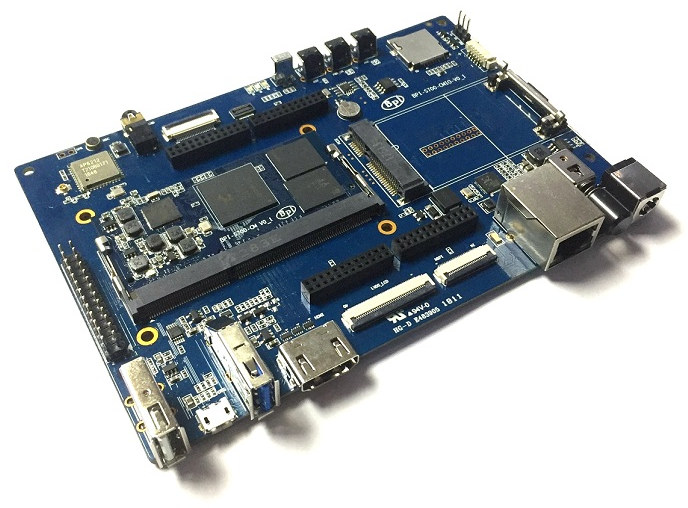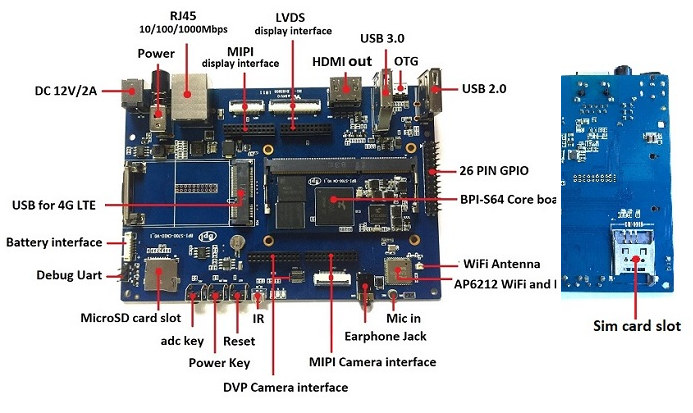SinoVoIP has launched many development boards & SBCs under the Banana Pi brands, but so far they had not designed any system-on-modules (SoM).
Banana Pi BPI-S64 Core is their first SoM, which they refer to as “Compute Module” for the compulsory Raspberry Pi reference, and it’s not based on Allwinner or Realtek processors used in many of their recent boards, but instead an Actions Semi S700 quad core Cortex A53 processor.
 Banana Pi BPI-S64 Core specifications:
Banana Pi BPI-S64 Core specifications:
- SoC – Actions Semi S700 quad core Arm Cortex-A53 processor with Arm Mali-450MP4 GPU with OpenGL ES2.0/1.1, OpenVG 1.1, EGL 1.5 support
- System Memory – 2GB LPDDR3
- Storage – 8GB eMMC flash
- Edge Connector – 204-pin SO-DIMM connector
- Power Supply – PMIC on-board
- Dimensions – 67.5 x 30 mm
The company also provides Banana pi BPI-S64 core kit for getting started with the module.
 Development kit preliminary specifications:
Development kit preliminary specifications:
- SODIMM slot for Banana BPI-S64 Core SoM
- Storage – micro SD card slot
- Video Output / Display I/F
- HDMI output with HDCP 1.4, up to 1920×1200
- MIPI DSI & LVDS
- Video – MPEG-4, H.264, H.265 decoding, H.264 encoding
- Audio – Via HDMI, headphone jack, audio input/output via headers, built-in microphone
- Camera – 1x DVP camera interface, 1x MIPI interface
- Connectivity
- Gigabit Ethernet
- 802.11 b/g/n WiFi and Bluetooth 4.0 (via AP6212)
- SIM card slot for 4G modem
- USB – 1x USB 3.0 host, 1x USB 2.0 host port, 1x micro USB 2.0 USB OTG port
- Expansion
- 26-pin header with GPIOs, UART, I2C, SPI, PWM, I2S…
- mPCIe slot for 4G LTE USB modem
- Misc – RTC battery interface, buttons (reset, power, ADC), RGB LEDs, IR receiver
- Power Supply – 12V @ 2A via DC power
- Weight – 150g
 I’m fairly confident some mistakes have found their way into the specifications above, as there are a bit all over the place in the Wiki, which for now provides only limited hardware information. There’s no word about software but Android and Linux should be supported. Banana Pi documentation and firmware support is usually poor for hobbyist, but for companies – which are the target of such modules – support *might* be better.
I’m fairly confident some mistakes have found their way into the specifications above, as there are a bit all over the place in the Wiki, which for now provides only limited hardware information. There’s no word about software but Android and Linux should be supported. Banana Pi documentation and firmware support is usually poor for hobbyist, but for companies – which are the target of such modules – support *might* be better.
Banana Pi is also used to make early announcements for their product, and while they now have made the first samples, the actual product launch is likely 3 to 6 months away.

Jean-Luc started CNX Software in 2010 as a part-time endeavor, before quitting his job as a software engineering manager, and starting to write daily news, and reviews full time later in 2011.
Support CNX Software! Donate via cryptocurrencies, become a Patron on Patreon, or purchase goods on Amazon or Aliexpress





I don’t see anything interesting here. S700 CPU is older technology, similar to Allwinner A64. Only Android 5.1 available. The cellular stuff is nothing special, any CPU can attach to a USB cell module. It does have way better video encoding than the A64. A64 video encoding is close to being unusable. S700 would be viable if they had Android Oreo for it.
I’m done with messing around on ancient Android. Google is in the process of actively blocking anything before Android 8 from the Play Store. Not implement yet, but they have announced that it is coming. Existing device IDs will have access grandfathered in, but no new pre-Android 8 devices will be allowed Play Store access unless you go to a developer website and type in your device ID. The idea is to force people to stop selling pre-Android 8 devices.
Cubieboard7 (also S700) ended up being $160. It seems to be a failure, no one is stocking it except Actions Semi themselves.
I suspect this product will fail. It is going to fail because you picked the wrong SOC, not because of the DIMM module. DIMM modules are a good thing and they do sell. There are multiple companies that only produce DIMM modules and nothing else.
quite agree. The youtube video at the bottom of the wiki page : https://www.youtube.com/watch?v=v-6w9jJDQKY&feature=youtu.be
Kernel 3.10.52 … now thats what I call progress .. they must have been working on this from stone age
And by this they also prove their total lack of understanding of how -stable works. In addition to not being supported anymore, this kernel misses 3400 well known fixes that reached the same branch and that they could have had for free, had they cared about security a minimum…
It’s progress! Actions Semi kernel for their 32-bit S500 three years ago was a 3.10.37 (but after poking them for some time through LeMaker at least they patched it up on their own to 3.10.100 or something like that back then).
Really impressive that there are still SoC and board makers acting that way and not giving a sh*t about decent software support at all.
BTW: the Youtube video also shows only cpu0 and cpu1 being up (but maybe that was for the KODI demo to demonstrate working video decoding with HW acceleration)
And another interesting detail. The video shows they run Mate 1.8.1. Now let’s look at https://wiki.debian.org/Mate and we see they’re using a Debian Jessie OS image which makes perfectly sense given that Stretch is the actual stable release since a year now.
Ah, I forgot… Debian Stretch needs at least kernel 3.14 for all features to work. Too bad the SoC ‘supports’ only 3.10.52 😉
Also, Jessie’s EOL date is 6/6/2018, in 3 days. So, almost week full of software “support”.
Nice, another board with kernel 2.4, android 1.6 and u-boot 2005 “support”.
Good Try, but i think they choice wrong SoC again, guys look to RockChip please. Would be a better choice RK3328 (Price/Performance/Support).
> for companies – which are the target of such modules – support *might* be better.
The other Actions Semi SO-DIMM (S500 on LeMaker’s ‘Le Guitar’) was targeting clueless hobbyists only. How should this change here? Are ‘companies’ really interested in hardware for which zero upstream support but only a smelly BSP exists consisting of kernel/Android from 3 to 4 years ago?
Also really impressed by SinoVoip’s product development strategy. Each new Banana relying on another and totally incompatible SoC. Instead of focusing on getting software support straight for at least one or two SoCs and then choosing these SoCs for new designs, choosing all the time new SoCs ensures that software support situation on every new board will always be the same: crappy 🙂
Their yet not released BPi-R64 will use MT7622A (dual-core A53 hopefully more or less compatible to 32-bit MT7623?) but no idea what their BPi-F2 will be based on. What could F be an indication for?
it should be BPi-WTF2
Orange Pi is doing the “reusing the same SoC” thing well but I think they’re releasing too *many* similar boards
Orange Pi hasn’t released that many new boards lately. FWIW, they also don’t update the software kit once there is full mainline support. For example U-Boot 2011 instead of 2018.05. Kernel 3.x instead of 4.16. How come? At least te U-Boot could be easily upgraded without any issues?
Cubietech Limited are using the same SoC and S500, for some reason they is value in them.
I’ve been informed Actions Semi S700 support (at least basic) was added to Linux 4.16.
https://www.cnx-software.com/2018/04/02/linux-4-16-release-main-changes-arm-and-mips-architectures/